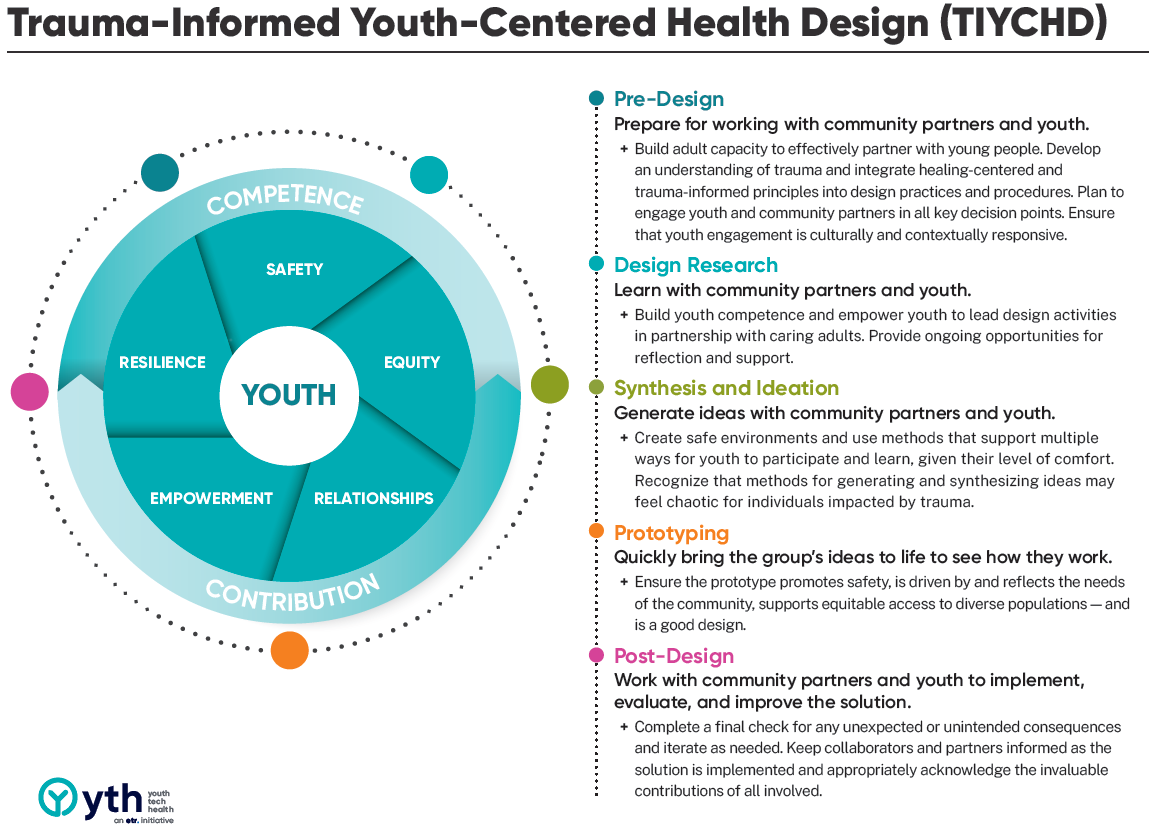
What is Trauma-Informed Youth-Centered Health Design (TIYCHD)?
The YTH Initiative at ETR created a framework for Trauma-Informed Youth-Centered Health Design (TIYCHD) that integrates principles from Human-Centered Design,1 Positive Youth Development,2 and Trauma-Informed Approaches.3 The TIYCHD framework supplements other ethical considerations when doing design work with young people.
TIYCHD works in partnership with young people at every step of the design process by placing youth at the center of all we do. Recognizing that young people and designers may be impacted by trauma, TIYCHD integrates healing-centered and trauma-informed principles – focusing on safety, equity, relationships, empowerment and resilience–into all design practices and procedures.4 Furthermore, TIYCHD leverages elements from Positive Youth Development to build youth competence to contribute solutions to the health challenges that most impact their lives.
Why TIYCHD?
It is estimated that 7 in 10 young people around the world have experienced one or more traumatic events, leading to lasting effects on individuals, families, and communities.5 With the growing popularity and utilization of design thinking approaches to address sensitive public health topics such as sexual and reproductive health, HIV, mental health and violence, it is imperative that funders, designers and public health practitioners recognize the impact of trauma on all those who participate in the design process and respond in ways that both minimize harm and promote well-being for youth and adults alike. This is particularly important when working with young people who have experienced trauma or live in communities impacted by trauma. Surrounding young people with safe, caring relationships and positive, empowering experiences can instill hope and healthier ways of being.
Why “Health Design” and not just “Design?”
This framework focuses on designing for health programming, specifically for young people. While Human-Centered Design has been used around the world to create products and programs across a variety of issue areas, our approach has been developed and tested exclusively around public health issues affecting youth. The considerations and tips referenced here are specific to our experience in designing for youth health among communities impacted by trauma.
This framework is designed for those conducting Human- and Youth-Centered Design with young people, anywhere in the world. Visit yth.org/projects/TIYCHD/ or contact us at [email protected] for more information on how to use TIYCHD in your setting.
The YTH Initiative created this framework through a community consultative process, in partnership with 40 community members representing mental health and trauma-informed backgrounds, Human-Centered Design, public health, philanthropy, and, of course, youth themselves.
We would like to thank the following individuals who participated in a community consultation leading to the development of this framework:
- Sarah Fathallah, Independent Designer and Researcher
- Michael Fu, Project Zeeni
- Milagros Garrido, Healthy Teen Network
- Amy Iftekhar, The David and Lucile Packard Foundation
- Tara Pokras, Agile Six Applications
- Ana Lilia Soto, Center for Youth Mental Health & Wellbeing, Stanford Department of Psychiatry & Behavioral Sciences
- Anh Ta, Trauma Transformed
- Brian Villa, UC Berkeley
1. TIYCHD is rooted in IDEO’s Human-Centered Design Process. For more information, visit: www.designkit.org/human-centered-design.
2. For more information on Positive Youth Development, visit: www.youthpower.org/positive-youth-development
3. For more information on Trauma-Informed Approaches, visit: https://ncsacw.samhsa.gov/userfiles/files/SAMHSA_Trauma.pdf
4. These principles are adapted from UCSF’s Healthy Environments and Response to Trauma in Schools (hearts.ucsf.edu/) and further informed by Shawn Ginwright’s commentary on Healing-Centered Engagement (medium.com/@ginwright/the-future-of-healing-shifting-from-trauma-informed-care-to-healing-centered-engagement-634f557ce69c)
5. Kessler RC, et al. Trauma and PTSD in the WHO World Mental Health Surveys. Eur J Psychotraumatol. 2017;8(sup5):1353383.
